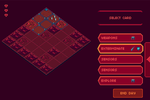Red Dust
A card-based strategy game where you hunt down worms in the Red Planet.
(Not too happy with how the gameplay turned out for this one, but I hope you enjoy it anyway.)
Awards
Scores
Ratings (show detail)
Overall: 3.8
Fun: 3.2
Production: 4.4
Innovation: 3.8
Respondents: 13
Files
| File | Uploader | Date |
|---|---|---|
|
RedDust-ss.png
Red Dust. Screenshot. |
Tee | 2022/09/10 23:27 |
|
RedDust.zip
— final
Red Dust. Final entry. |
Tee | 2022/09/10 23:25 |
Diary Entries
Red Dust: Done
The core idea of Red Dust is a card/strategy game where each round represents an expedition, and your cards represent the supplies that let you move around the map each day. Each card also has a special effect, most of which can only be activated once in special locations (ruins). Your goal is to get rid of all the worms in the area with special cards.
I personally find strategy games difficult to get right in Pyweek. This is in part because there is a lot of implementation work, but also because I have a hard time tightening and fine-tuning them in a short amount of time. This week I spent most of my time on the interface and framework, and I'm happy with how the game looks and feels (given my limited artistic skill), but I just couldn't get the gameplay to work the way I wanted to. The mistake on my end was that given the time pressure I thought I'd just keep grinding through the implementation and try to figure out the gameplay in the end, and I got something playable a few hours before submitting but I didn't know how to actually make it fun within the time frame.
I think there is potential for a good resource-balancing card game based on this concept even if I wasn't able to get there. In retrospect, there are several design issues and a major one is that the game doesn't really have imminent threats or anything that makes you keep moving, and it's very easy to play safe. I did have a boss-type sandworm that would occupy multiple tiles and you had to kill it as your end goal, but I didn't have time to finish that (the code is still there, commented out).
That said, although I wish I had spent more time on the design phase at the very beginning, implementing this game was still an interesting experience. I hope you can get a feel of what I was aiming for and enjoy it.
I personally find strategy games difficult to get right in Pyweek. This is in part because there is a lot of implementation work, but also because I have a hard time tightening and fine-tuning them in a short amount of time. This week I spent most of my time on the interface and framework, and I'm happy with how the game looks and feels (given my limited artistic skill), but I just couldn't get the gameplay to work the way I wanted to. The mistake on my end was that given the time pressure I thought I'd just keep grinding through the implementation and try to figure out the gameplay in the end, and I got something playable a few hours before submitting but I didn't know how to actually make it fun within the time frame.
I think there is potential for a good resource-balancing card game based on this concept even if I wasn't able to get there. In retrospect, there are several design issues and a major one is that the game doesn't really have imminent threats or anything that makes you keep moving, and it's very easy to play safe. I did have a boss-type sandworm that would occupy multiple tiles and you had to kill it as your end goal, but I didn't have time to finish that (the code is still there, commented out).
That said, although I wish I had spent more time on the design phase at the very beginning, implementing this game was still an interesting experience. I hope you can get a feel of what I was aiming for and enjoy it.
